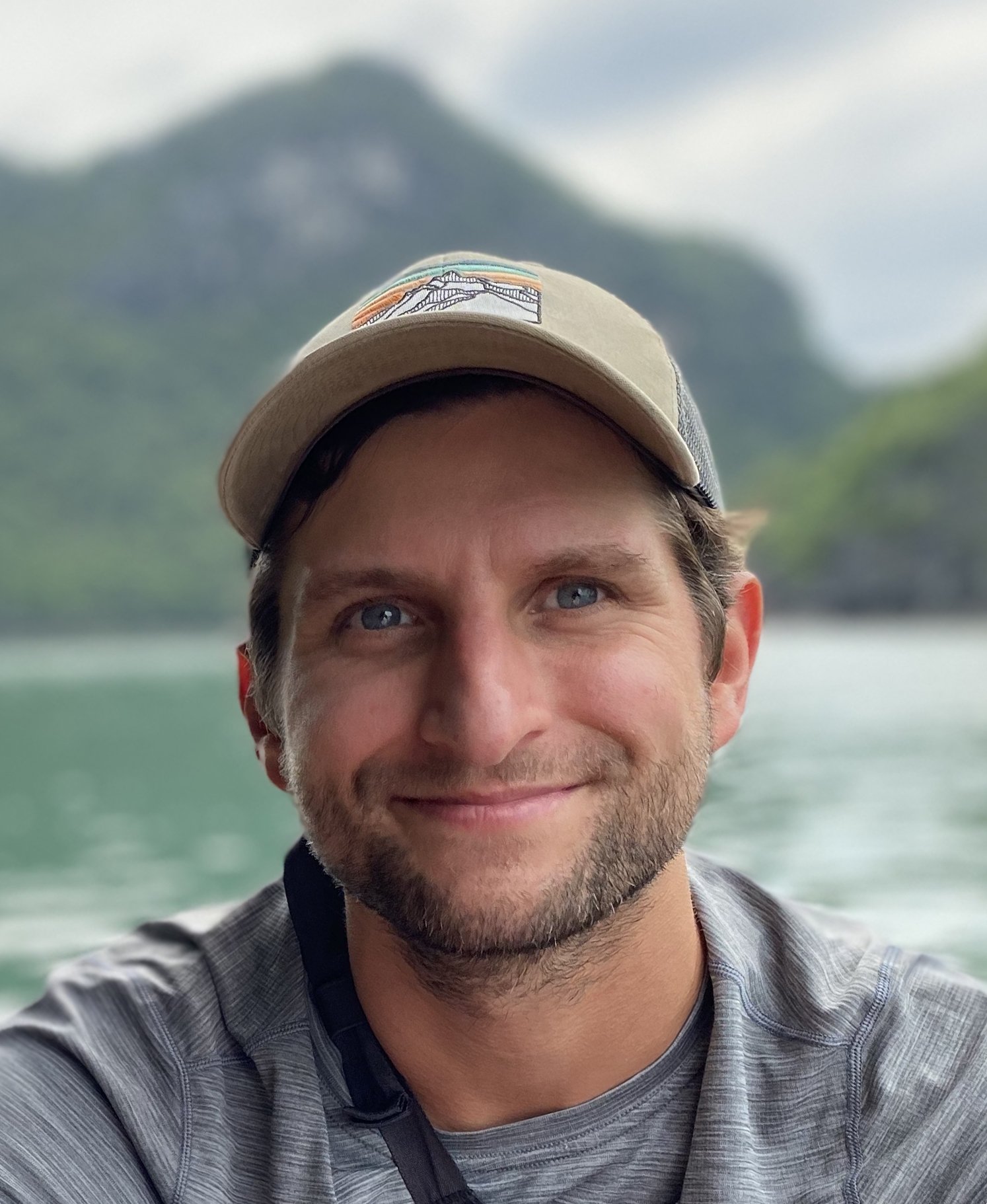The Scientific Panel is the steering committee for the Manta Trust's research themes. They provide expert oversight to the contributers in line with the Manta Trust’s Five-Year strategic plan.
DR. GUY STEVENS
Guy Stevens is the Chief Executive and Founder of the Manta Trust. He has spent the last 20 years studying mobulids all over the world and is one of the foremost experts on these species. He founded the Maldives Manta Conservation Programme in 2005 and after 11 years of research, he completed his PhD on the world’s largest population of reef manta rays at the end of 2016.
His conservation efforts in the Maldives have led to the creation of several marine protected areas at key manta aggregations sites, most notably at Hanifaru Bay. Internationally, he is part of a team which has driven the conservation of mobulids forward, resulting in the listing of all manta and devil rays in the Appendices of the Convention on the Conservation of Migratory Species of Wild Animals (the Bonn Convention) and the Convention on International Trade in Endangered Species of Wild Fauna and Flora (CITES). He is the author of two books; the award-winning MANTA – The Secret Life of Devil Rays, published in 2017, and the Guide to Manta and Devil Rays of the World, published in 2018, and he has also published over 40 peer-reviewed research papers.
DANIEL FERNANDO
Daniel is a Sri Lankan marine biologist and the co-founder of Blue Resources Trust; a marine research and conservation organisation, where he leads the Fisheries and Policy Programme. He has been providing technical support for elasmobranch policy at multilateral environmental agreements such as CITES and CMS for over a decade, helping bridge the gap between science and policy and encouraging a shift toward sustainable fisheries. He has previously served as a ministerial advisor and as Vice Chair to the Sessional Committee of the CMS Scientific Council. He is currently the Regional Co-Vice Chair of the IUCN SSC Shark Specialist Group for the Indian Ocean and an MCAF Fellow.
DR. JOSH STEWART
Joshua Stewart is a marine ecologist and conservation biologist specializing in vulnerable marine megafauna. His research combines field observations using cutting edge technology with advanced quantitative tools to understand how foraging ecology and predator-prey interactions translate into population trends, how population vital rates are driven by variable environmental systems and climate change, and how an increasing human footprint in the oceans interacts with natural patterns to influence conservation outcomes for threatened species.
Josh was a founding member of The Manta Trust in 2011, and is president of Action for Mantas, The Manta Trust’s sister charity in the United States. He obtained his PhD focused on the ecology and conservation of mobulids from Scripps Institution of Oceanography in 2018, and began working on endangered marine mammal species with the NOAA Southwest Fisheries Science Center in 2019. Josh is currently an Assistant Professor at the Oregon State University Marine Mammal Institute, where, in addition to his work with mobulids, he studies species including humpback whales, gray whales, killer whales, and pinnipeds in the U.S., the Eastern Pacific, and the Indian Ocean.
DR. GIUSEPPE NOTARBARTOLO DI SCIARA
Giuseppe earned his Ph.D. in Marine Biology at Scripps Institution of Oceanography, University of California San Diego in 1985. Mantas and devil rays have always played a role in his career; he started out as a species-oriented marine ecologist focusing on marine mammals and manta rays, of which he described a new species, Mobula munkiana. Since these beginnings, he progressively moved towards place-based marine conservation.
In 1986, he spearheaded the creation of the Italian national cetacean stranding network, which he coordinated until 1990. In 1986, he founded the Tethys Research Institute in Milano, which he directed until 1997 and again from 2010 to 2016. In 1991, he proposed the creation of the Pelagos Sanctuary for Mediterranean Marine Mammals, established in 1999 by a treaty between Italy, France, and Monaco. In 1996, he was nominated president of the Central Institute for Applied Marine Research in Rome, the Italian governmental body providing scientific and technical support to national marine conservation policy, where he served for seven years. From 1999 to 2003, he served as Commissioner or Alternate Commissioner for Italy at the International Whaling Commission, from 2002 to 2010 as Chair of the Scientific Committee of ACCOBAMS, and from 2014 to 2022 as the Convention of Migratory Species CoP-appointed Councillor for aquatic mammals. In 2013, he started the Important Marine Mammal Area (IMMA) programme as an initiative of the IUCN Marine Mammal Protected Areas Task Force, which he created with Erich Hoyt. He later applied the lessons learnt with the IMMA programme to support the quality of senior advisors in the Important Shark and Ray Area (ISRA) initiative implemented by the IUCN Shark Specialist Group. He has taught science and policy of the conservation of marine biodiversity at the University Statale of Milan from 2007 to 2016.
His current activities include: Co-chair, IUCN Joint SSC/WCPA Task Force on Marine Mammal Protected Areas (since 2013); Member, IUCN Species Survival Commission – Cetacean Specialist Group (since 1991) and Shark Specialist Group (since 1993); Member of the Scientific Steering Committee of GOBI, the Global Ocean Biodiversity Initiative (since 2013).
DR EMILY HUMBLE
Emily first volunteered for the Maldives Manta Conservation Programme back in 2011 and has since worked closely with the Manta Trust through her work on manta and mobula ray genetics. Emily completed her Masters in Biodiversity genomics at Imperial College London and her PhD on fur seals at the British Antarctic Survey and Bielefeld University. She is currently a Research Fellow at the University of Edinburgh where she specialises in the use and development of genetic tools for informing conservation management. Emily works on broad range of species including some of the world’s most vulnerable sharks and rays.
DR ASIA HAINES (ARMSTRONG)
Asia is an Australian marine scientist with a particular passion for the conservation of threatened species, especially sharks and rays. She grew up on the east coast of Australia, in northern NSW, and spent all her spare time in and around the water. After some years exploring the world as a diver and traveller, she returned to university to gain her Bachelors in Marine Studies where she obtained a first class Honours for her research on reef manta ray foraging requirements. During this time Asia worked with the Australian Marine Conservation Society, an advocacy group focussed on increasing marine protected areas and strengthening laws around threatened species management and protection. Her doctorate examined the spatial ecology of manta rays in Australian waters, and she has been working with the multidisciplinary team at Project Manta for the past decade. Asia has vast experience in the collection and use of citizen science data, and engaging stakeholders and community members to get involved with research and conservation. She has joined the IUCN Shark Specialist Group on their Important Shark and Ray Area project to assist with delineating critical habitats for this threatened taxa, and conduct Red List assessments of shark and ray species globally. Asia has been a long-term collaborator with the Manta Trust team and their affiliates.
DR. MARK ERDMANN
Dr. Mark Erdmann is the Vice President of Asia Pacific Marine Programs for Conservation International, with a primary focus on providing strategic guidance and technical and fundraising support to CI's marine programs in the Asia Pacific region, especially West Papua. Mark is a coral reef ecologist (Ph.D. University of California, Berkeley) who lived and worked for 23 years in Indonesia, though is now based in New Zealand. During this time, he has logged over 13,000 scuba dives while surveying marine biodiversity throughout the region, and has now described 186 new species of fish, mantis shrimp and corals. He has published 245 scientific articles and 5 books, including most recently the 3-volume set "Reef Fishes of the East Indies" with colleague Dr. Gerald Allen. Mark was awarded a Pew Fellowship in Marine Conservation in 2004 for his work in marine conservation education. Though his work is now largely focused on the management of marine protected areas, his continuing research interests include reef fish and mantis shrimp biodiversity and elasmobranch conservation science, and he maintains research associate positions with the California Academy of Sciences and the University of the Sunshine Coast.
For the past 9 years, Mark has worked with other Manta Trust scientists to conduct manta ray acoustic and satellite telemetry studies in Indonesia, Papua New Guinea, New Caledonia, Fiji, Australia, and New Zealand, and has been deeply engaged in advising the Raja Ampat government and Indonesian Ministry of Marine Affairs and Fisheries in developing manta ray and other elasmobranch protection regulations.
Mark now lives with his wife Arnaz and three children in Auckland, and maintains a deep personal commitment to do whatever is necessary to ensure his children can enjoy the same high-quality underwater experiences that continue to inspire his dedication to the marine environment.








